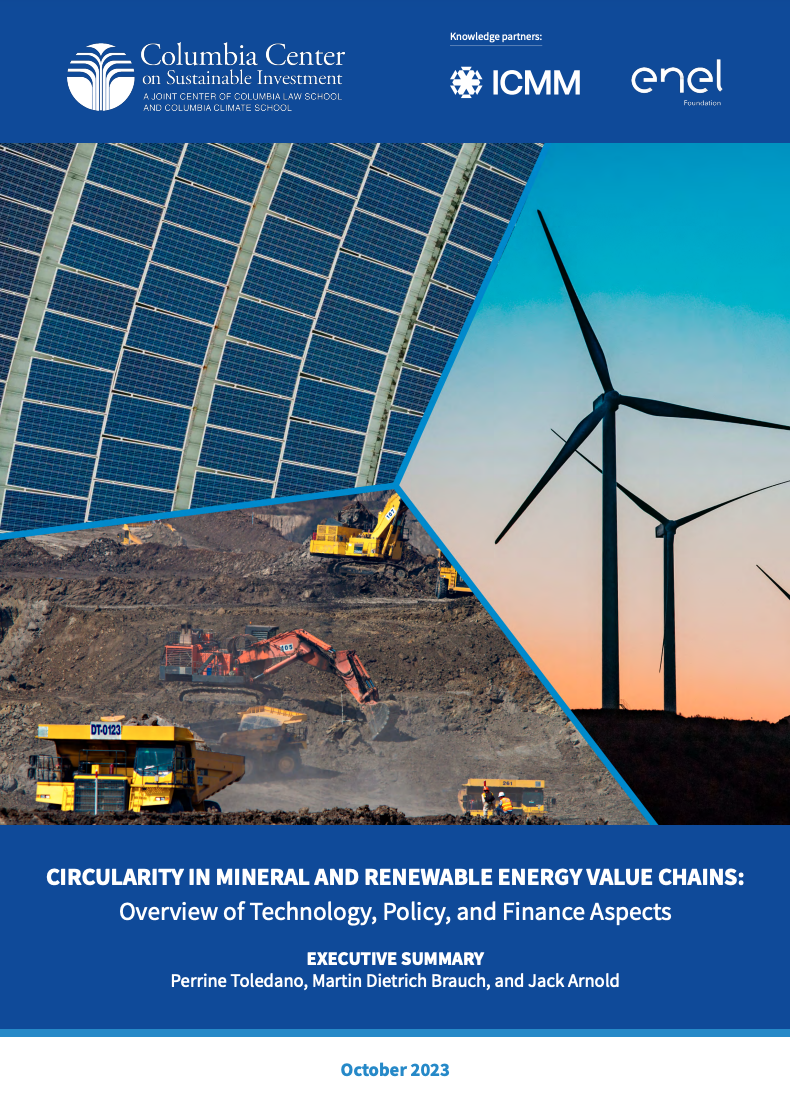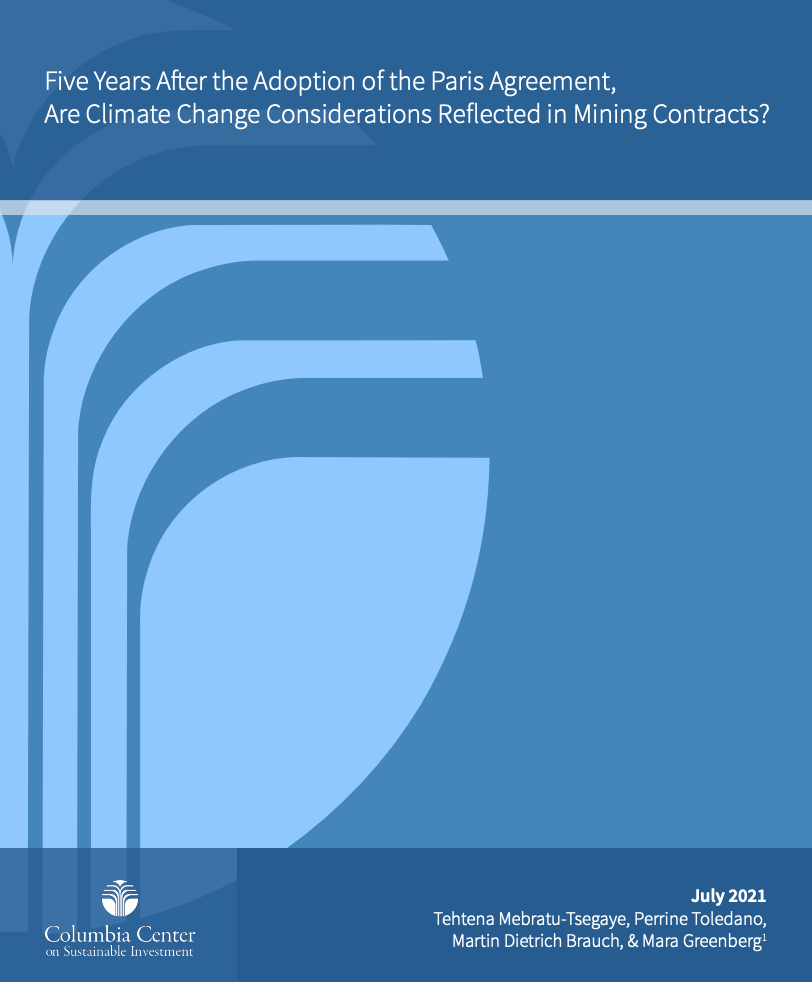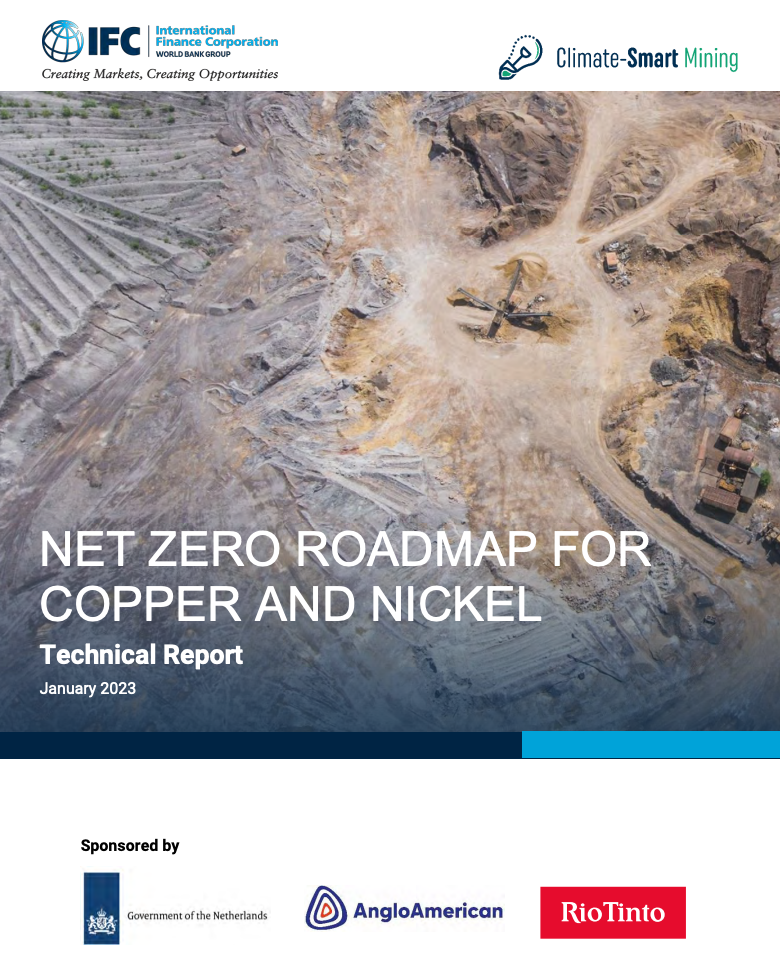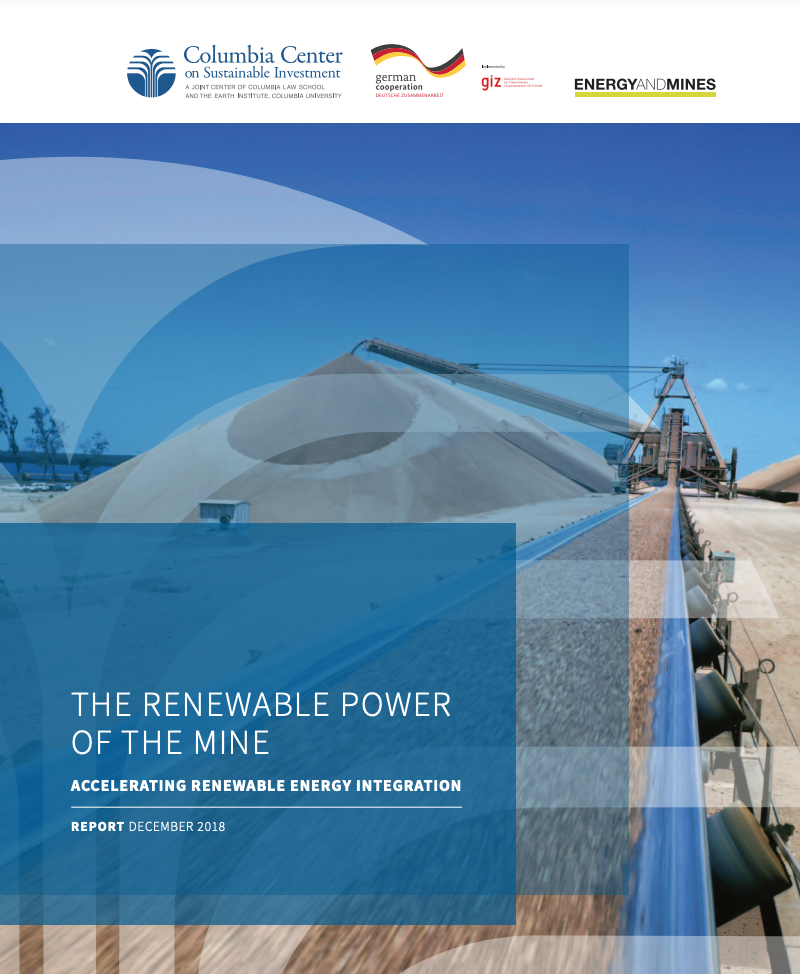Investments in mining have the potential to transform economies. We provide resources and analysis aimed to help stakeholders —including governments of mineral-rich economies, mining companies, investors, and civil society leaders—, advance sustainable resource-based development strategies within respective countries, regions, and internationally. In particular, we focus on the evolving challenges and opportunities that come from the central role of mined materials for the energy, digital, and other sustainable development transformations.
At CCSI, we are thought leaders in pairing responsible primary production of minerals and metals with circular economy approaches, and in enhancing the ability of mining operations and value chains to contribute to climate change mitigation and adaptation goals, in light of the urgent need to phase out fossil fuels and transition to renewable energy systems.
CCSI has long-standing work focused on making sure that investments in the extractive industries are managed prudently to ensure that they translate into long-term sustainable development and minimize economic, social, and environmental harm.
Sustainable Resource Based Development Strategy
When the UN Member States agreed on the set of 17 Sustainable Development Goals (SDGs), they set the global agenda for equitable, socially inclusive, and environmentally sustainable economic development until 2030. Extractive industry companies have the potential to become leading partners in achieving the SDGs.
CCSI conducted a study that maps a selection of the major initiatives designed to promote good governance of the extractives sector for GIZ. The mapping describes the scope and use of each initiative and highlights areas where initiatives overlap in their approach and focus. The mapping provides recommendations on the applicability of different subsets of frameworks and initiatives to different tasks and circumstances... read more.
Those supporting extractive projects tend to emphasize the benefits resulting from tax revenues and employment, while those opposing the project will often highlight the adverse impacts on the environment and impacted communities. CCSI is seeking to advance the integration of non-financial costs and benefits in fiscal assessments of extractive industry investments.
In partnership with the World Economic Forum, CCSI curated the Transformation Map of the Mining and Metals sector; it maps out the seven drivers that are already and will continue transforming the mining and metals sector.
CCSI created and manages the Negotiation Support Portal to improve the accessibility of tools, resources and technical assistance to support host governments' planning, preparing for, negotiating, monitoring, and implementing large-scale resource and infrastructure investments. The portal also facilitates coordination among support providers and host governments. In addition, CCSI has launched a series of meetings of negotiation support providers to create a forum to discuss common challenges and opportunities, and to facilitate greater coordination among support providers.
This 2011 project examined how the vast resource deposits in the Tete province, combined with other major investments along the Nacala and Beira corridors, can be the basis for sustainable, equitable and inclusive growth in the Lower Zambezi Basin.
In partnership with the Uongozi Institute, CCSI prepared a brief that reviews developments in the international gas market, with particular focus on proposed offshore gas projects in Tanzania. As Tanzania positions itself to benefit from gas discoveries by increasing its domestic gas use, the brief outlines some of the trade-offs and considerations for negotiating the domestic gas allocation.
CCSI was contracted to write the extractive industries section of the World Bank Diagnostic Trade Integration Study (DTIS) for Tanzania. The study identifies the internal and external trade constraints that hinder the development of the priority sectors, and provides policy recommendations on how these obstacles can be overcome.
CCSI has launched an interview series on “company personalities” looking in particular at how a company’s personality determines its negotiation strategy, the contractual provisions it pushes for, and the overall relationship between the company and the host governments. The interviewees are senior experts who have many decades of experience in advising governments in resource rich countries.
CCSI is a knowledge partner to the New Petroleum Producers Discussion Group project, co-organized and sponsored by Chatham House, NRGI, the Africa Governance Initiative and the Commonwealth Secretariat. This project aims to help emerging oil and gas producers to think critically about the various policy options available during the first steps of exploration and development, or when restructuring their petroleum sector. This project devises policy options which are most effective within a context of low institutional and sector capacity.
CCSI is a knowledge partner to the New Petroleum Producers Discussion Group project, co-organized and sponsored by Chatham House, NRGI, the Africa Governance Initiative and the Commonwealth Secretariat. This project aims to help emerging oil and gas producers to think critically about the various policy options available during the first steps of exploration and development, or when restructuring their petroleum sector... read more.
Transparent and Mutually Beneficial Legal Framework
CCSI works with governments and civil society organizations to provide advice on various issues relating to the regulatory regime for the extractive industries. Here you can find examples of the types of advising we have conducted, as well as the analysis that is publicly available.
A searchable and user-friendly database of publicly available oil, gas, and mining contracts from around the world, searchable by country, natural resource, or type of contract
A collection of publicly available agreements between local communities and investors, and occasionally host government parties, in the context of resource projects
CCSI examined the advantages and disadvantages of different mineral regimes (licensing regimes vs. contractual arrangements) in 18 countries around the world. For the 13 countries that used mining contracts, CCSI further examined the contract negotiation and implementation processes of 30 mining contracts as well as the relationship between those countries' mining contracts and their legal regimes. CCSI also identified potential opportunities for external experts to support resource rich, low income countries in contract negotiations.
This study surveyed the trend toward countries integrating competitive bidding provisions for mineral rights allocation into their national legislation and regulations, and sought to analyze the potential issues around these provisions. 29 countries are included in the review.
Written by a diverse group of 14 experts from Africa, Asia, North America, South America, and Europe, “Mining Contracts: How to Read and Understand Them” is a user-friendly guide to help policy makers, civil society, citizens, and the media understand the often complex and opaque terms of mining contracts. The guide is available in English and in French.
CCSI has examined local content provisions contained in legal frameworks governing resource investments, including in contracts, legislation and bidding practices.
CCSI has examined the use of built-in review periods in extractive industry contracts as a mechanism for managing investor and host-country relations over the duration of a project. CCSI completed a survey of periodic review mechanisms contained in extractive industry contracts, to analyze how they have been used to date, and to understand the purposes for which they may usefully be applied.
Many governments, companies, and international institutions have endorsed contract transparency in natural resources, particularly within the extractive industries. However, more must be done to make contract transparency a standardized and meaningful norm that leads to better accountability within the extractive industries, as well as around investments in land, agriculture, and forestry.
CCSI, together with the World Bank and Natural Resource Governance Institute, has developed ResourceContracts.org, an online, searchable and user-friendly database of publicly available oil, gas and mining contracts from around the world. Users can search contracts by country, by natural resource or by type of contract; view summaries of key social, environmental, fiscal, and operational provisions; and download full contracts... read more.
International investment law has evolved rapidly into a complex web of over 3,000 investment treaties used to challenge a wide range of host state actions and inactions. These challenges expose host states to potentially significant financial costs, and can restrict the ability of such states to maximize the benefits—and limit the environmental and social harms—that can result from the exploitation of natural resources. This briefing note (updated in July 2022) provides an introduction to international investment law to assist stakeholders in grasping the diverse and significant implications of this body of law for the governance of investments in the extractive industries sector.
Fair and Competitive Fiscal Framework
The petroleum industry is volatile, and governments in “new producer” countries have operated at a significant information disadvantage when negotiating with international oil companies. This challenge is growing today; new producer countries face intensifying questions around whether to offer fiscal incentives to maintain investment in the face of 1) the pandemic-induced volatility in oil prices and 2) long-term questions about the future of the industry in the face of the climate crisis and the global energy transition.
This confluence of short-term and long-term uncertainty is prompting a reexamination of the narrative that once took hold in many new producer countries. The traditional story was one of linear progression from being non-producers to small levels of production to ultimately having oil and gas become a major economic contributor over the long term.
This notion of progression was associated with a commonly held theory: After a country’s first major discovery, the geological risk that wells will be dry was expected to decrease. Countries could therefore shift from a position of having to grant tax breaks (and other concessions) to international investors, to taking a tougher stance in laws and negotiations for new projects going forward.
In this paper (executive summary here), co-authored with NRGI we examine whether this theory has been borne out in practice and make recommendations to support new producers in their navigation of the uncertainty associated with the energy transition.
CCSI advises governments and civil society organizations on various issues relating to fiscal frameworks for the extractive industries sector.
Monitoring fiscal reforms in extractive industries is an ongoing part of CCSI's research. CCSI is researching aspects of designing and implementing fiscal regimes in an attempt to identify legal and fiscal elements that can help avoid unintended consequences or disputes between an investor and the government over the course of the investment.
CCSI strongly supports the transparency of contracts and tax flows and has published research and papers making the business case for transparency, including two submissions to the SEC in 2011 and 2015.
Alongside growing revenue and contract transparency, increasing fiscal model transparency is needed. Only with financial model transparency can relevant actors better assess whether contracts are balanced in terms of fiscal returns and understand when revenues start flowing to the government. CCSI strongly supports financial model transparency and has developed two open fiscal models. We are currently welcoming feedback on their usefulness, user-friendliness, and on any observed inaccuracies.
The allocation of the rights to tax business profits of non-resident entities’ operations depends on whether these operations can constitute a “Permanent Establishment” (PE) according to the definition included in each DTA. CCSI's research and brief looks at this issue in the context of extractives and provides a sample clause that optimizes the PE definition for resource rich countries.
Building on the momentum created by the Platform for Collaboration on Tax’s draft paper regarding taxing indirect transfers of source country assets, CCSI and the International Senior Lawyers Project (ISLP) wrote a paper providing practical guidance to developing country governments on the taxation of indirect transfers of extractive industries’ assets. Indirect transfers occur when—instead of selling the asset—the shares of the domestic subsidiary, the shares of the foreign company with a branch in the country, or the shares of the holding company are sold.
Long-Term Planning and Revenue Management
Alongside the Natural Resource Governance Institute (NRGI), CCSI conducted a world-wide survey of Natural Resource Funds, considering their management, investments, transparency, and accountability to the public, as well as the fiscal rules that govern them. This project seeks to foster cross-country experience-sharing on fund governance.
CCSI supported the drafting and adoption of the 20 year Strategic Development Plan for Timor-Leste, and helped to develop new institutions and laws to optimize the use of the country's petroleum fund for development.
Infrastructure and Linkages
To be beneficial for a country’s development, non-renewable resource extraction should be leveraged to build long-term assets—such as transportation, power, water, and information and communications technology (ICT) infrastructure—that will support sustainable and inclusive growth. Countries can leverage extractive industry–related investment to fill their infrastructure-funding gap. Read more.
CCSI prepared a report on measuring employment from extractive industry investments that outlines two modeling techniques used to estimate employment multipliers: 1) The input-output (IO) model, and 2) The computable general equilibrium (CGE) model. The handbook explains the advantages, disadvantages, necessary inputs, and results associated with each model.
The employment potential of investments in extractive industry projects and land acquisitions for agriculture is often touted both by governments and by companies in support of investor-friendly policies and large-scale investments in natural resources. CCSI is examining how job numbers are calculated, which factors influence job creation, and the quality and sustainability of these jobs, as well as whether job creation generated from these investments is net positive.
This research project assesses the channels through which knowledge and technology can be transferred and, based on successful country case studies, provides recommendations on how governments can enhance technological spillovers in oil, gas, and mining... read more.
CCSI, IISD, and Engineers Without Borders researched the technological innovations in mining that are being developed, assessing when these technologies could be rolled out, and quantifying their impact on local employment and procurement and how local content policies should adapt.
CCSI looked at the economic prerequisites that attract first-degree downstream beneficiation industries—such as steel mills—and the extent to which these industries have contributed to further domestic linkages in the past, and assessed whether it makes sense to provide large incentives for these investments.
GIZ worked with CCSI to develop research and training materials around economic linkages to the resource sector.
Integrated Community Development and Human Rights
CCSI has done research and supported stakeholders on the politics of free, prior and informed consent (FPIC), community development requirements and agreements (CDAs), and human rights impact assessments (HRIAs) in investment projects in extractive industries.
Environmental & Climate Change Risks & Impacts
As part of a two-year research project co-sponsored by the Earth Frontiers Seed Grant of Columbia’s Earth Institute and the UN Development Programme in Guinea, CCSI is conducting a legal review of the current environmental and political framework for regulating the mining industry in Guinea. This review supports the work of partners at the Lamont-Doherty Earth Observatory and Columbia’s Earth Institute, who are developing a mobile application that could allow community members in affected areas to locate, record, and track instances of red dust generated by the extraction and transportation of bauxite.
CCSI worked with the Columbia Water Center to develop and benchmark a modeling platform for quantitatively assessing the environmental risks associated with gold and copper mining projects and their resulting financial implications. CCSI reviewed the legal and regulatory frameworks governing the use and discharge of water by the copper and gold mining sectors, and published a study on whether and how water-related issues in the mining sector drive social conflict. CCSI also organized an event for institutional investors to discuss water-related risks from an investor perspective, and developed a framework for shared-use of water and water infrastructure in the mining sector.
Mining & the Circular Economy
Shifting to a circular economy is crucial in achieving sustainable development and decarbonization. One of the core stages of implementing circular principles in the mining industry is in post-mining closure. CCSI’s Circular Economy: Mine Land Potential map is intended to be used by companies, researchers, academics, civil society, and government officials as a general guide and visualization tool for post-mining land-use potentials. Innovative mine land uses can turn a liability into an asset, generate economic opportunities, contribute to sustainable development, and enable progress towards a net-zero economy while avoiding detrimental damage of critical natural resources and habitats.
The mineral-intensive global energy transition and the increasing material needs of a growing population will exacerbate mining’s footprint on the planet, under current linear economy conditions. Responsible primary production of minerals and metals needs to be combined with circular economy approaches. CCSI’s report Circularity in Mineral and Renewable Energy Value Chains: Overview of Technology, Policy, and Finance Aspects examines existing conditions as well as reforms needed to enable global circularity in the mineral value chains of solar photovoltaic (PV) panels and wind turbines, zeroing in on four key materials: aluminum, copper products, silicon, and steel. The project was supported by ICMM and the Enel Foundation.





